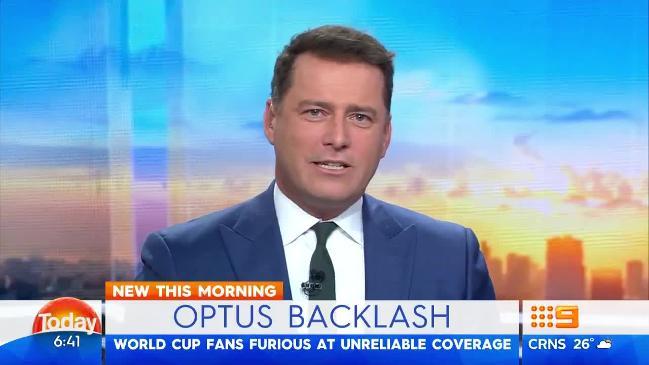Football fans are fuming over Optus’ World Cup coverage, but it’s not entirely to blame
OPTUS has become public enemy number one with sports fans across Australia with its poor World Cup coverage. But it’s not entirely to blame.

AS THE FIFA World Cup 2018 kicked off in Russia, a new era in World Cup viewing was also dawning in Australia.
World Cup broadcasting rights were shared between a free-to-air (FTA) broadcaster, SBS and a subscription-based telecommunication company, Optus.
The latter has the rights to all 64 matches.
After happily sharing coverage of the opening match of the tournament, the second game of the World Cup was exclusive to Optus Sport’s streaming platforms.
The broadcast was hit with technical difficulties and many ‘viewers’ took to social media to vent their frustration at their inability to watch the match.
#OptusFail was trending on Twitter alongside World Cup-related hashtags.
While Optus have been pilloried for the failure of their streaming service, there is a deeper issue.
Optus secured the broadcasting rights following a sub-license deal with SBS, who previously held exclusive rights to broadcast the whole tournament.
This deal is now being criticised.
We all just want to watch the @FIFAWorldCup but we can’t ! Shame on all of you ! And you know who you are ! Night
— Robbie Slater (@RobbieSlater17) June 16, 2018
The Broadcasting Services (Events) Notice, often known as the anti-siphoning list, details a number of events whose televising should “be available free to the general public”.
This legislation aims to stop pay TV broadcasters buying the rights to these events before their FTA counterparts.
Until recently, each match of the FIFA World Cup tournament was included on the anti-siphoning list.
Fans have questioned why SBS, the FTA broadcaster who won the rights to show this World Cup, are not showing all of the matches.
SBS secured the Australian rights to the 2018 and 2022 FIFA World Cups in 2013.
At that time, their managing director Michael Ebeid stated that it was their “dedication to football and to giving the most comprehensive live and free-to-air television coverage in Australia that [had] cemented” their bid.
Ebeid also highlighted the fact that they had been the exclusive World Cup broadcaster since 1990.
MORE: Karl savages ‘hopeless’ Optus
However, everything changed when Optus secured the rights to broadcast the English Premier League in 2016.
SBS traded their exclusive World Cup rights for a slice of one of the world’s most watched leagues.
They struck a deal that allowed them to sub-license free-to-air TV rights for one English Premier League match per round for the three seasons.
Its 2016 press release that announced the deal details that SBS would: “Retain simultaneous free-to-air rights to 25 of the matches and Optus will have exclusive rights to the whole tournament, with 39 exclusive live matches”.

For the first time, Australian fans have been required to pay to watch all games in the World Cup.
Events once recognised to be a “right of cultural citizenship” now require a premium subscription.
The anti-siphoning list only gives FTA broadcasters the first right to negotiate TV deals.
It does not force FTA broadcasters to buy the rights. They can also choose not to show events that they hold the rights for.
Pay TV operators can also televise the events if a FTA broadcaster covering “more than half of the Australian population has purchased the rights”.
Additionally, the list of scheduled events has been revised and it is only the World Cup final and matches that involve the “senior Australian representative team” that are included.
FTA broadcasters are increasingly looking to capitalise on the demand for live sport.
SBS sub-licensed the rights that they held and other FTA providers are partnering with subscription-based broadcasters to out-bid their rivals.

A number of sports are happy to accept increased rights fees from such deals.
While “each event held as part” of the Summer and Winter Olympic Games are scheduled, Seven West Media only provided FTA access to some events during recent Games. Viewers were then required to pay a subscription fee to access the full coverage from this free-to-air broadcaster.
The writing may be on the wall and Australians will need to get used to paying to watch World Cup matches.
Dr Keith Parry is a Senior Lecturer at the School of Business and the Insitute for Culture and Society. Twitter: @sportinaus



